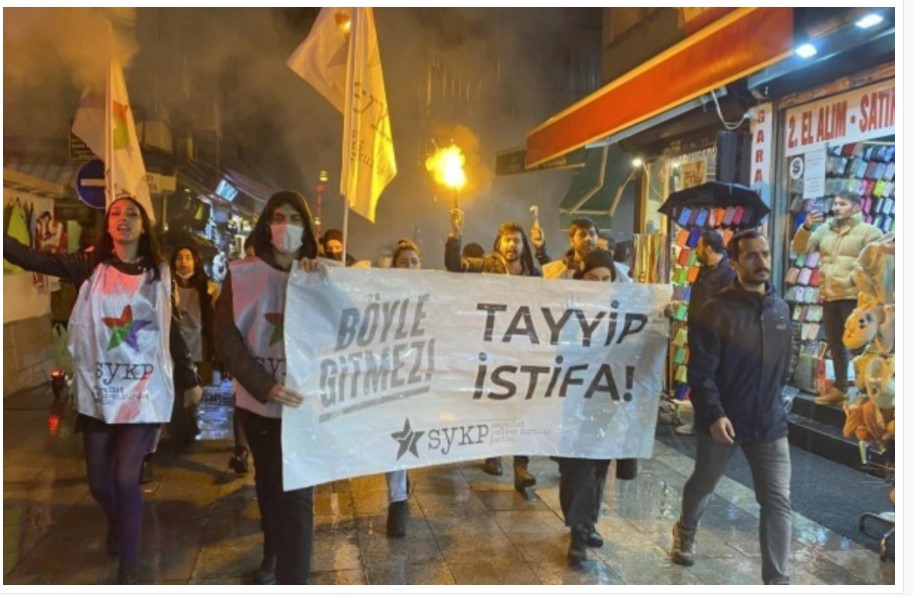The violent economic crisis currently hitting Turkey has caused President Recep Tayyip Erdogan and the ruling Justice and Development Party (AKP) to decline in popularity, making them are more likely to leave the political scene.
Perhaps the greatest evidence of this is the increase in the scope and continuation of demonstrations in the recent period, especially in the cities of Ankara and Istanbul, in protest against the rise in prices of basic commodities and the increase in the poverty rate following Erdogan’s wrong economic policies, with increasing demands for his resignation.
WATCH: Turkish Opposition is Marching to Power | Real Turkey
Erdoğan’s popularity
The recent demonstrations and protests reflect the erosion of the popularity of Erdogan and his party in the Turkish street due to the wrong decisions he took over recent years, whether at the political or economic levels. Recently, Ankara abandoned its philosophy of zeroing problems in accordance with the theory of zero problems and turned into a country hostile to its regional surroundings due to its involvement in Iraq, Syria and Libya and its harassment of the territorial waters of Greece and Cyprus.
This comes in addition to the differences of the Turkish regime with NATO and the United States and the repressive policies adopted by Ankara following the failed coup attempt on July 15, 2016, in the wake of which it carried out a large-scale purge of state institutions under the pretext of combating the coup, and Ankara continues to undermine public freedoms and track down opinion-holders and opponents on charges of terrorism.
Economic mistakes
The Turkish regime made multiple economic mistakes, as Erdogan insisted on keeping bank interest rates low, expecting that this would lead to the promotion of economic growth and export in a competitive currency. But what happened was the opposite of his expectations, as the Turkish lira collapsed (1 lira = 0.075 US dollars), and its purchasing power weakened, which in turn raised the prices of consumer products in a way that made the president’s attempts to raise the minimum wage to counter inflation futile.
WATCH: Turkey Heading for Early Elections | Real Turkey
Additionally, the government’s savings plan to support the local currency is expected to lead to economic catastrophe in the long run, as the government guarantees returns on deposits in lira at a rate similar to what it might earn from holding foreign currency to compensate for any additional decline in the value of the dollar. In return, the Turks must keep their lira in banks for a period of 3, 6, 9 or 12 months, similar to certificates of deposit, meaning that the Turkish government guarantees that depositors receive the returns of their money in banks according to the real, not nominal, interest rate, which adds new burdens on taxpayers.
Categorical protests escalate
The aforementioned was a direct reason for the escalation of categorical protests in the recent period, as hundreds of citizens demonstrated at the end of November 2021 against Ankara’s exit from the Convention on the Protection of Women from Violence, along with other demonstrations in which thousands protested against the decline in social services, while five health care unions representing about 250,000 workers and doctors went on strike for one day, on December 15, in protest against low wages and harsh working conditions amid the collapse of the currency, stressing that strikes are continuing and resignations from public hospitals will increase during the coming period, as well as calling on the government to resign.
The demonstrators did not only demand economic reforms, but reached to demand the overthrow of Erdogan and the holding of early elections, according to what was announced by opposition leaders, led by Republican People’s Party (CHP) leader Kemal Kılıçdaroğlu. On December 18, 2021, Kılıçdaroğlu stressed the need to hold early parliamentary and presidential elections as soon as possible so that chaos does not strike the country due to the spread of poverty caused by the devaluation of the lira and the increase in inflation.
Erdogan realizes that it is not in his interest now to hold elections, as he knows that his popularity has declined greatly recently, and the chances of his exclusion from the political scene have become very likely, as his opponents are stronger than ever before.
By Mahmoud al-Batakoushi, The Reference-Paris
Follow our English language YouTube videos @ REAL TURKEY: https://www.youtube.com/channel/UCKpFJB4GFiNkhmpVZQ_d9Rg
And content at Twitter: @AtillaEng
